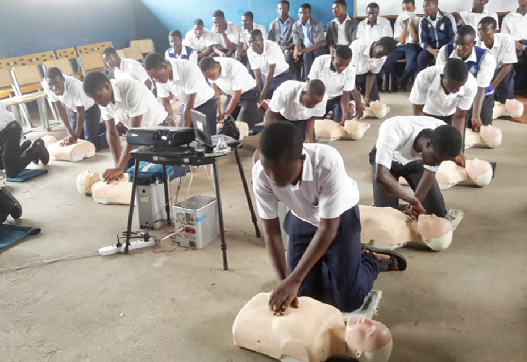
NVTI-PTI students, staff train in CPR
The National Vocational Training Institute-Pilot Training Institute (NVTI-PTI), in collaboration with Africa Partners Medical, Ghana (APMG), an NGO, has trained students and staff of the institution in cardiopulmonary resuscitation (CPR) to enable them to provide first aid and save lives at the workplace.
The four-day CPR or basic life support (BLS) training session was held with the support of Q-Education, an educational development services provider.
CPR or BLS is a life-saving technique that helps to maintain some blood flow to the brain and heart during cardiac arrest to help ‘buy time’ until the victim receives more advanced care.
Speaking on the sidelines of the event, the Executive Director of APMG, Mr David Frempong, said training in CPR or BLS was necessary as a result of the lifestyle changes among Ghanaians, adding that the lack of rest, exercise, improper diets and eating habits could contribute to incidents of cardiac arrests.
“Clinical investigations indicate that there are two main peaks of occurrence of cardiac arrest — 8 a.m. to 11 a.m. and 4 p.m. to 7 p.m. These periods fall within the normal school/working hours of the average worker/student,” he said.
He said the APMG said the BLS or CPR was a simple life-saving procedure that could be taught the ordinary person to get the skills.
Cardiac arrest
“When people get cardiac arrest they need help immediately so within minutes you need someone who can perform CPR or BLS. That is why we are training the schools and the churches for free,” he said.
Mr Frempong said the students were taken through how to check the pulse and chest compression of a person in danger of cardiac arrest as well as resuscitation.
The Manager of the NVTI-PTI, Mr Maxwell Zanu, said the training was important, since most of the students would be going into industry where their services would be needed.
Life-saving, he said, was important and, therefore, any efforts that were geared towards that should be encouraged and supported by all.
“We want to build the capacity of our students and staff in life saving efforts. This is to add to the skills they are acquiring at the institute so that in case of any accident at the workplaces they would act fast,” he said.
Mr Zanu noted that first aid was key, and that it would be adopted by the institute.
